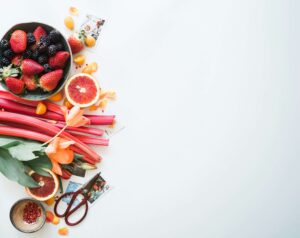Hair Health Starts from Within

When it comes to achieving luscious locks, many people focus solely on external treatments like shampoos and conditioners, overlooking the critical role that nutrition plays in hair health. Just like the rest of your body, your hair needs essential nutrients to grow strong, vibrant, and resilient. By nourishing your body from within, you can support healthy hair growth and achieve the gorgeous locks you’ve always dreamed of. In this comprehensive beauty blog, we’ll explore the connection between nutrition and hair health and share some expert tips for incorporating hair-friendly foods into your diet.
Understanding the Link Between Nutrition and Hair Health
Your hair is a reflection of your overall health and well-being, and what you eat can have a profound impact on its appearance and vitality. Hair follicles are among the most metabolically active structures in the body, requiring a constant supply of nutrients to support their growth and maintenance. When you provide your body with the right combination of vitamins, minerals, and other essential nutrients, you create an optimal environment for healthy hair growth.
- Protein:
Protein is the building block of hair, and adequate intake is essential for strong, resilient strands. Hair is composed primarily of a protein called keratin, which gives it strength and structure. Without enough protein in your diet, your hair may become weak, brittle, and prone to breakage.
Incorporate protein-rich foods into your diet such as lean meats, poultry, fish, eggs, dairy products, legumes, nuts, and seeds. These foods provide the amino acids necessary for keratin synthesis, helping to strengthen hair follicles and promote healthy growth.
- Vitamins and Minerals
Several vitamins and minerals play key roles in hair health, including vitamin A, vitamin C, vitamin E, biotin, niacin, iron, zinc, and selenium. These nutrients support various aspects of hair growth and maintenance, from collagen production and antioxidant protection to oxygen transport and hormone regulation.
To ensure you’re getting an adequate intake of these essential nutrients, focus on eating a balanced diet rich in fruits, vegetables, whole grains, lean proteins, and healthy fats. Incorporate foods like spinach, carrots, sweet potatoes, citrus fruits, berries, nuts, seeds, eggs, lean meats, and fatty fish into your meals to provide a diverse array of vitamins and minerals that support hair health.
- Omega-3 Fatty Acids
Omega-3 fatty acids are essential fats that play a crucial role in maintaining healthy hair and scalp. These fatty acids help nourish the hair follicles, reduce inflammation, and promote optimal oil production, leading to stronger, shinier strands.
Include omega-3-rich foods in your diet such as fatty fish (salmon, mackerel, sardines), flaxseeds, chia seeds, walnuts, and hemp seeds. Alternatively, consider taking a high-quality fish oil supplement to ensure you’re meeting your omega-3 needs, particularly if you don’t consume fish regularly.
- Hydration
Hydration is key for healthy hair and scalp. Dehydration can lead to dry, brittle hair and a flaky scalp, making it essential to drink plenty of water throughout the day to keep your hair and skin hydrated from the inside out.
Aim to drink at least eight glasses of water per day, and consider incorporating hydrating foods into your diet such as cucumbers, watermelon, oranges, strawberries, and leafy greens. Herbal teas and coconut water are also excellent hydrating options that can support overall hair health.

Incorporating Hair-Friendly Foods into Your Diet
Now that you understand the importance of nutrition for hair health let’s explore some practical tips for incorporating hair-friendly foods into your diet:
- Start Your Day with a Nutrient-Rich Breakfast
Kickstart your morning with a balanced breakfast that includes protein, healthy fats, and fiber to support energy levels and promote hair health. Opt for options like Greek yogurt with berries and almonds, avocado toast with eggs, or a smoothie made with spinach, banana, and chia seeds.
- Snack Smart
Choose nutrient-dense snacks to keep your energy levels up and your hair happy throughout the day. Reach for options like carrot sticks with hummus, a handful of mixed nuts, or a piece of fruit with nut butter for a satisfying and hair-friendly snack.
- Load Up on Fruits and Vegetables
Aim to fill half your plate with fruits and vegetables at each meal to ensure you’re getting a wide range of vitamins, minerals, and antioxidants that support hair health. Experiment with different colors and varieties to maximize your nutrient intake and keep your taste buds happy.
- Incorporate Plant-Based Proteins
If you follow a plant-based diet or are looking to reduce your meat consumption, incorporate plant-based sources of protein into your meals such as beans, lentils, tofu, tempeh, quinoa, and edamame. These foods provide essential amino acids necessary for healthy hair growth without the saturated fat and cholesterol found in animal-based proteins.
- Experiment with Superfoods
Superfoods are nutrient-rich foods that offer a host of health benefits, including supporting hair health. Experiment with superfoods like acai berries, goji berries, spirulina, and maca powder by adding them to smoothies, yogurt bowls, or salads for an extra nutritional boost.
Hair health starts from within, and by nourishing your body with the right combination of nutrients, you can support strong, vibrant, and resilient locks. Incorporate protein-rich foods, vitamins, and minerals, omega-3 fatty acids, and hydrating foods into your diet to provide your hair with the essential building blocks it needs to thrive. By prioritizing a balanced diet rich in nutrient-dense foods, you can achieve the gorgeous locks you’ve always dreamed of and embrace your natural beauty from the inside out.




